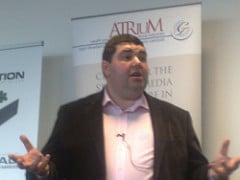
 Best known for its professional travel writing, BBC Worldwide’s Lonely Planet plans to republish online reviews penned by amateur travel bloggers – and will pay the authors via a revenue sharing agreement. The scheme, codenamed BlogSherpa as a working title, will begin in February and was revealed by Lonely Planet’s online innovation ecosystem manager Matthew Cashmore at the Swn interactive seminar in Cardiff on Thursday.
Best known for its professional travel writing, BBC Worldwide’s Lonely Planet plans to republish online reviews penned by amateur travel bloggers – and will pay the authors via a revenue sharing agreement. The scheme, codenamed BlogSherpa as a working title, will begin in February and was revealed by Lonely Planet’s online innovation ecosystem manager Matthew Cashmore at the Swn interactive seminar in Cardiff on Thursday.
Lonely Planet employs 500 professional authors, but there is also a lot of high-quality travel material written online, by unpaid but insightful bloggers, that remains hard to find, Cashmore said: “What Lonely Planet has is traffic. If we can provide a gateway to your content and if you let us put that content on lonelyplanetcom, we’ll give you the advertising on that page. Imagine how much you’ll be earning if your Google (NSDQ: GOOG) AdWords ID is on a Lonely Planet page.
“For the first few months, the commercial model is going to need some messing around with. We’re going to add in all the banner advertising for that page, the money that you earn if a user clicks (through) and books a hotel somewhere – there’s lots of ways we can pay you for that content. Bloggers will have an avenue where they can earn some money for their writing and can get their writing to a broader audience; from our point of view, loneyplanet.com will have a much broader base.”
Lonely Planet’s website relaunched on Thursday, with new trip planning and data functions. But that’s just a small step in how the brand wants to use the web – around January or February, a full API will be made available to offer Lonely Planet’s vast content base available to third-party publishers, and Lonely Planet Groups will bolster on-site interaction. Cashmore called it “a new era of openness and sharing”.
Details on the strategy…
The publisher has been trying to unlock its content for the web since its estimated £100 million acquisition by BBC Worldwide a year ago – and since former BBC Backstage coordinator Cashmore joined Lonely Planet in Australia in August. “You can’t truly interact with people who want your content unless you let the content be the platform. The brand is adopting four models for online content redistribution – 1) conventional commercial licensing, 2) licensing for free to non-profits, 3) straightforward linkbacks and 4) revenue sharing. This new material will be available for licensing both to new parent BBC Worldwide and to third parties like Rough Guides, which has complained the BBC’s impetus gives Lonely Planet an unfair advantage.
Explaining the openness strategy, Cashmore said: “Getting a book publisher to understand that you should take everything you have in your database and put it online is a real shift in the way that they think, (but) there are really good commercial reasons for opening our content and giving it away.” On the flip side, “there’s a danger that by opening up and allowing content to be free that your brand becomes ubiquitous, who wants their brand to become as ubiquitous as Tesco?.”